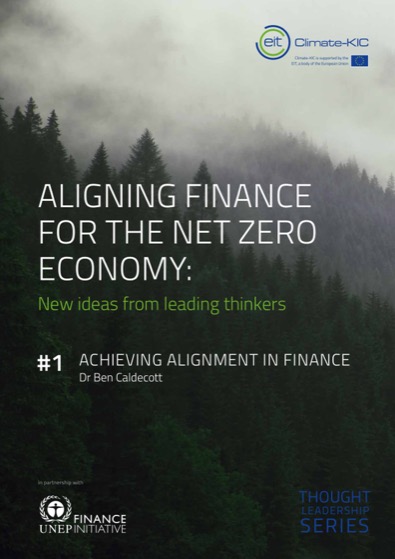UNEP FI has partnered with EIT Climate-KIC to develop a series of thought leadership papers that aims to inspire financial actors worldwide to move from risk to alignment, challenge current assumptions around climate alignment and develop ideas and concepts on how alignment can best be achieved. We hope to encourage stakeholders that a proactive climate response is not only about disclosing risks, but also about investing in green opportunities that can enable the low emissions societies of the future. This series convenes innovators and industry experts to provoke discussion, challenge the status quo and guide the transformation of business and finance towards a sustainable future.
The papers in this series will respond to a number of key questions :
- What economic system transformation is actually required to deliver the Paris Agreement?
- How do financial institutions achieve alignment with the Paris Agreement and how does it differ from transition risk transparency as captured in the TCFD?
- What is the future of financial institutions as a result of these changes?
- What are the various strategies and action tracks through which financial institutions can enhance and achieve full portfolio alignment?
- What are the pathways and choices needed for financial institutions and the financial system to drive an active transition to a net zero-carbon economy?
The first two papers are authored by two leading thinkers on climate finance and economic transition:
Dr Ben Caldecott (University of Oxford):
“Achieving Alignment in Finance”
In this paper, Ben Caldecott examines how financial institutions can move beyond climate-risk management and towards much closer alignment with climate outcomes. Instead of incidentally contributing to alignment with climate outcomes through climate risk management initiatives, we need specific ways of dealing with and contributing to the challenge of alignment. This report is a non-exhaustive attempt to try and rebalance the conversation, in which Dr Caldecott outlines three crucial elements necessary to align a financial institutions’ business strategy with climate outcomes. The paper also develops a number of further recommendations that would help to ensure climate alignment at the systemic level.
Dennis Pamlin (Research Institutes of Sweden):
“Transformations Required for 1.5°C Alignment and Global Sustainability”
Dennis Pamlin discusses the necessary transformations and new opportunities in the global economy and finance sector to meet the objectives of the Paris Agreement. Much of the work in the financial system so far has focused on transparency and reducing risk and how such work can improve through better data and tougher criteria. However, in a rapidly changing world, the important question is how actions in the financial system support the concrete solutions needed in society and how they relate to what is needed for a 1.5°C compatible scenario, in particular a scenario with significant innovation and transformative system solutions, such as the IPCC’s Low-Energy-Demand (LED) pathway.
Read the next two reports in the series:
Innovation and Transformation: What it will take to finance net zero by Richard Roberts & John Elkington (Volans)
Finance 2030: A Time Travel Exercise by Jakob Thomä & Anne Schönauer (Two Degrees Investing Initiative, 2DII).



